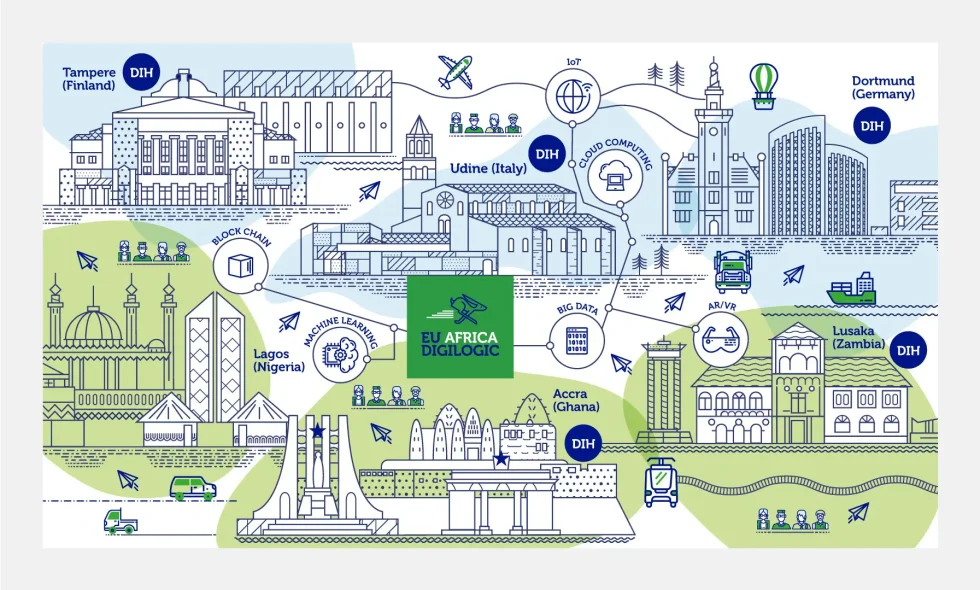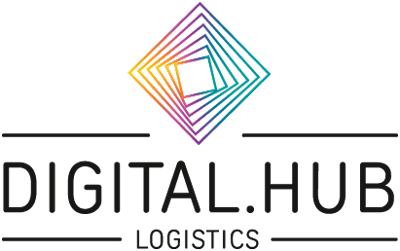
DIGILOGIC supports logistics innovators working for efficient and sustainable supply chains in Africa
The growing economy in sub-Saharan Africa is increasing demand for world-class transportation and logistics services, which are critical to business success. This is especially true for African entrepreneurs and innovators looking to ship products and expand their regional presence. The current situation presents many challenges, but also additional opportunities, especially for innovators. For many, logistics innovations can lead to higher yields, greater market share, and the development of new markets while reducing production costs.
The agriculture, technology and retail sectors offer particularly large opportunities for entrepreneurs. Lack of infrastructure, climatic problems and social fragmentation are among local challenges. As global logistics systems are often affected by extreme weather conditions and social conflicts, analyzing new logistics solutions in Africa could provide valuable insights into the future of European logistics. Increasing connectivity and new technologies are driving the adoption of digital solutions in African logistics. Blockchain, intelligent transportation systems, and Internet of Things (IoT) integration offer unprecedented opportunities for supply chain optimization.
DIGILOGIC, a project funded by the European Commission under the EU Horizon2020 program, aims to digitally transform the African logistics sector. Last year, innovators, startups and SMEs from Africa were invited to submit proposals focused on four different phases of logistics: Warehousing, Transportation, Point-of-Sale and End-User Experience. After a selection process, 12 innovators were chosen, including talent from Zambia, Kenya, Ghana and Nigeria. The selected teams are addressing various digital logistics challenges. This ranges from local production of more efficient vehicles to the provision of information and energy in value networks spanning urban areas and remote regions. The selected innovators were mentored and supported by DIGILOGIC partners to develop and expand their solutions. Adriano Mauro, Managing Director of Prototipi, emphasizes the importance of digital technologies for logistics in Africa: “African innovators with viable solutions often lack networks and communities to develop their solutions efficiently, and this is where DIGILOGIC can support.”
The inventors of these innovative logistics solutions participated in a 3-day bootcamp in Europe and received 12 months of support from DIGILOGIC partners in Europe and Africa. In June 2023, the teams participated in the DIGILOGIC Demo Day, which coincided with the AU-EU Innovation Festival 2023. There, they were able to present their developed solutions. They also had access to the Digital Innovation Hub facilities in Africa and Europe and had the opportunity to meet with investors and potential customers. On December 12, DIGILOGIC’s partner Prototipi is planning an online event where participants will have the opportunity to present their work to various investors and potential buyers.
DIGILOGIC COMMUNITY
All entrepreneurs, innovators, startups and tech-savvy people interested in logistics can join the DIGILOGIC COMMUNITY. This is an interactive platform that promotes knowledge sharing, community building, networking and collaboration. Knowledge and skills can be enhanced in the areas of entrepreneurship, digital skills and key technologies for the Smart Logistics sector.
A wide variety of materials, such as podcasts and articles, are provided in the library.
DIGILOGIC-TREND-RADAR
Recently, the DIGILOGIC consortium completed and published the first TREND RADAR focusing on Sub-Saharan Africa. Globally, the trends in the logistics industry are already well known, especially from a Western perspective. However, this is not true for the African continent. According to the Trend Radar, which identifies and chronicles the key trends for smart logistics in sub-Saharan Africa, the adoption of digital technologies for logistics is not a top priority; instead, new and old digital and physical technologies are being combined to achieve the best possible results in the context of logistics in Africa. This is also reflected in the approach of African startups to overcome existing challenges.





